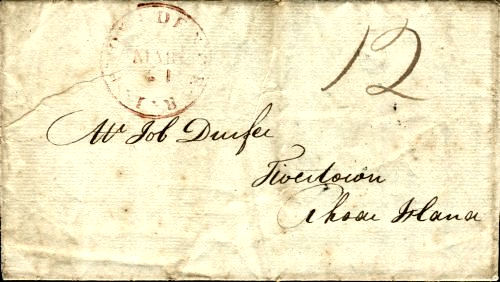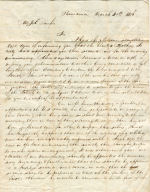![]()
Postal History Introduction
Stampless
Covers
1846
to 1900 Issues
1901-1950
Issues
1951-2003
Issues
Cancels
&
Miscellaneous
Postal
Stationery
Post
Cards
Air
Mail
First
Day &
Event Covers
Parcel Post/Special Delivery
Registered & Official Mail
Commercial & Advertising
Revenue & Postage Due
Wildlife & Game Issues
Complete List of RI Issues
|
Rhode Island Stampless
Covers & Letters |
|||||||||
|
|||||||||
|
The Stampless Folded letter above was sent
from Providence, RI by R. H. Ivy for the
appointing committee of the United Brothers Society.
This is the second such letter informing Mr. Durfee and his
selection as second poet for the next society anniversary,
(He had refused the first
appointment; most likely out of mistaken pride at not being
chosen first poet). The
letter sets forth reasons for Mr. Durfee to accept the
appointment and is actually a mild rebuke.
The cover has a red Providence CDS with the date and R.I. inverted. The 12 cent rate at the upper right is the War Rate which was established by the Postal Act of December 23, 1814 and increased the rates established in 1799 by 50 percent. This act was repealed by the Act of February 1, 1816, (effective March 31, 1816). The letter was sent just 11 days before the rates were changed to the 1799 restored rates. The rate was 8 cents for under 40 miles + the 50% charge for 12 cents total. |
|||||||||
|
SEE ALSO:
1816 Brown & Ives - Restored Rate Cover
Job Durfee was born on September 20, 1790 in Tiverton, Rhode Island to Thomas and Mary Lowden Durfee. He was a fourth generation descendent of Thomas Durfee, (born 1643) who emigrated to the colonies in 1660 and settled in Portsmouth, RI. Job's father was Chief Justice of the Court of Common Pleas in Newport. Job married Judith Borden, (born June 14, 1796 in Fall River, MA) on November 16, 1820 and they had seven children; Lucy D., Amy Borden, Thomas, Mary D., Simeon Borden, Sarah Ann, and Julia Marie. Job received his primary education at home and in the public schools. He entered Brown University in 1890, graduating in 1813 with honors and began studying law under his father's tutelage. Job's political leanings were Jeffersonian-Republican and in 1816 he was elected to the Rhode Island General Assembly. He was called to the Bar in 1817. In 1820, Job Durfee was elected to the United States House of Representatives and held that office until 1825. In 1826 he was reelected to the State Legislature and held the position of Speaker of the House until 1829. Job published a poem in 1832 entitled "What Cheer - Roger Williams in Banishment," which was not favorably received at home, although it received considerable praise in England. He was appointed to the bench as an Associate Justice of the Rhode Island Supreme Court in 1833; becoming the Chief Justice in 1835, which office he held until his death in 1847. Chief Justice Durfee's strong stand against the Dorr Rebellion and his early declaration that the movement was "illegal, without law and against law" and his later charge to the Grand Jury on the subject of treason, helped crystallize public opinion against the rebellion. Judge Durfee presided at the trial of Thomas Door, in which Door was sentenced to life imprisonment, (reduced to 1 year). I found one additional item of interest which ties into my Hazard family Correspondence. Roland G. Hazard delivered a discourse to the Rhode Island Historical Society on January 18, 1848 entitled, "The Character and Writings of Chief Justice Durfee." SEE: The Hazard Family Letters Chief Justice Job Durfee died July 26, 1847 in Tiverton, Rhode Island. COMPLETE TEXT OF THE LETTER: |
|||||||||
|
|||||||||

RI Historical
Society
Introduction
Stampless I
Stampless II
Stampless III
Stampless IV
Stampless V
Stampless VI
Brown & Ives Letters
The Hazard Family Letters
Joseph Tillinghast
Free Franked Letters
DeWolf Family Letters
Recently Added Pages

